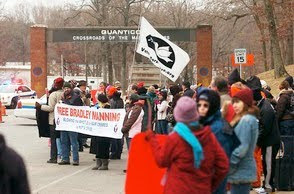
Per NBC,
U.S. military officials tell NBC News that investigators have been unable to make any direct connection between a jailed army private suspected with leaking secret documents and Julian Assange, founder of the whistleblowing website WikiLeaks.
The officials say that while investigators have determined that [Bradley] Manning had allegedly unlawfully downloaded tens of thousands of documents onto his own computer and passed them to an unauthorized person, there is apparently no evidence he passed the files directly to Assange, or had any direct contact with the controversial WikiLeaks figure.
See also
The Guardian. This is an important admission, because most legal scholars believe the US had no case against Assange unless it could show that he was personally involved in conspiring with Manning to cause the leak.
US officials also admitted that, after Manning "refused to follow an order," the Brig Commander had improperly put him on "suicide watch" for two days – which involves restrictions even more extreme than under the "prevention of injury" (P.O.I.) regime he'd previously been on.
Officials have otherwise denied any mistreatment of Manning. But he's been held in solitary for over 7.5 months under P.O.I., which involves
severe restrictions that are supposed to be imposed only if necessary in order to prevent an inmate from harming himself, despite the fact that the psychiatrists who have examined him have reported that it's unnecessary. Note that Manning not only has not yet been convicted, but his case has not yet even been set for hearing.
His attorney has filed a request for Manning's release based on the lack of response from officials and the fact that his confinement conditions are more severe than necessary, and
the United Nations' top anti-torture envoy is investigating the situation. (For more details regarding the conditions in which Manning is being held, see
FireDogLake; for more background and links, see
here.)
UPDATE: General James F. Amos, former commander at Quantico, has written
a powerful letter questioning the conditions under which Manning is being held.

Meanwhile, the previous day, David House, one of few previously permitted to see Manning, accompanied by FireDogLake's Jane Hamsher, attempted to deliver a petition signed by 42,000 demanding that Manning be released from solitary. Not only were they not permitted to see Manning, but they were
involuntarily detained and their car improperly searched and impounded; details at
FDL. Last week,
ca. 150 people gathered at Quantico to protest Manning's treatment.
Kevin Zeese has a good discussion on
HuffPo of Manning's "crime" of revealing war crimes: "Manning is suffering a fate Thomas Jefferson warned about: 'Most codes extend their definitions of treason to acts not really against one's country. They do not distinguish between acts against the government and acts against the oppressions of the government.'"
Per
Greg Mitchell, the
hearing on Assange's extradition from the UK to Sweden is scheduled for February 7 - 8. Re- Sweden's case, a former Swedish judge has written that the issuance of the European arrest warrant against Assange was probably contrary to law and has noted a number of irregularities, concluding, "it does appear as if something is being hidden under the carpet” (good summary at
WL Central).
The Guardian has an essay on how "
WikiLeaks turned the tables on governments, but the power relationship has not changed: [t]he information genie cannot be put back into the bottle . . . [b]ut the authorities continue to exploit the internet as a means of control. Some bits are i.m.h.o. flat wrong, but others are good:
So now we have two competing, and ugly, forces locking horns like bulls. On the one side are governments who, as Evgeny Morozov argues in his new book, The Net Delusion: How Not To Liberate The World, are exploiting the internet as a means of control rather than democratisation. They are aided in their endeavours by corporations such as Amazon, Mastercard, Visa and others who do the bidding of the authorities either under pressure or quite voluntarily in order to ingratiate themselves. On the other side is a small sub-section of the web 2.0 community who regard themselves as above the law, for whom all authority is bad and all information is good. As Jaron Lanier puts it in the Atlantic: "The ideology that drives a lot of the online world … is the idea that information in sufficiently large quantity automatically becomes Truth. For extremists, this means that the internet is coming alive as a new, singular, global, post-human, superior life form."
* * * * *
The media watcher John Lloyd noted recently that the WikiLeaks affair "reduces investigative journalists to bit players whose job is to redact the output and provide context". This predates the current saga. For years the Fourth Estate has under-invested in and devalued its responsibility – to use that pious phrase – to speak truth to power. I can never put out of my mind the remark of an old colleague, a one-time lobby journalist at Westminster, who told me after his first week running communications at a government department that he was staggered by how little journalists actually found out. Much of the content of the British media has been reduced to toxic comment or stenography for the powerful in politics, business, sport and elsewhere.
In other WL-related news . . .
WL is suffering financially: "We have been losing more than 600,000 (Swiss) francs a week since the start of the publication of the diplomatic cables," Mr Assange told a Swiss newspaper. "To continue our business, we would need to find a way or other to get this money back."
UPDATE: See
here for how to donate.
A cache of secret British documents leaked not to WL but to al-Jazeera TV has embarrassed Palestinian officials because of the degree of Palestinian-Israeli cooperation revealed; much more at
The Guardian.
The NYT has swung from publishing cables to throttling its coverage down while seeking to distinguish itself from WL and villifying Assange and now, apparently, back again: per
The Cutline,
The NYT is, like several other major news outlets, considering creating "an in-house submission system that could make it easier for would-be leakers to provide large files to the paper."
Greg Mitchell, who's been blogging the WL for
The Nation steadily since cablegate broke, will have a book out on the story soon. Last I saw, the title was to be,
The Age of Wikileaks.
A
horrifying This American Life episode describes the indoctrination of school kids at the Ronald Reagan Presidential Library, against freedom of the press.

And the best recent, WL-related humor:
the competition to design a new 'do for Assange (
much more at the link).
 "[T]the Egyptian government appears to have ordered service providers to shut down all international connections to the Internet. . . . [E]very Egyptian provider, every business, bank, Internet cafe, website, school, embassy, and government office that relied on the big four Egyptian ISPs . . . is now cut off from the rest of the world. . . .
"[T]the Egyptian government appears to have ordered service providers to shut down all international connections to the Internet. . . . [E]very Egyptian provider, every business, bank, Internet cafe, website, school, embassy, and government office that relied on the big four Egyptian ISPs . . . is now cut off from the rest of the world. . . .









.jpg)



.jpg)

.jpg)

.jpg)
